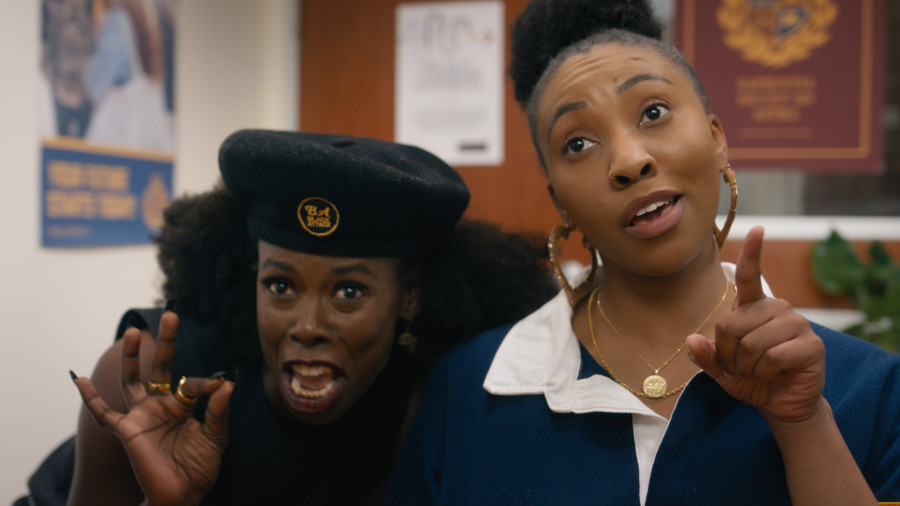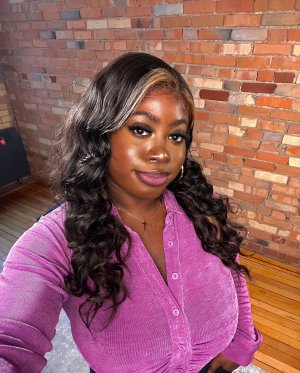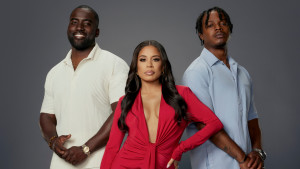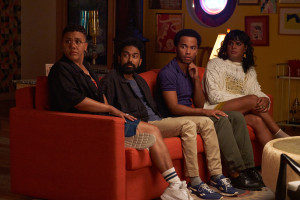The Canadian comedy series from Sasha Leigh Henry follows Bria Mack, played by Malaika Hennie-Hamadi, who’s a Black woman living in a mainly white world, navigating life with the help of her invisible hype girl, Black Attack.
Fresh out of graduation, Bria who’s been known to be an overachiever, moves back into her Jamaican mother’s home and begins her job hunt.
With scenes that will actually have you chuckling out loud, love interests that are all-too relatable, and punch-lines delivered with an authentic Patois accent, the show is refreshing to say the least — a real look into the everyday hustle of a Black woman in her 20s.
{https://www.youtube.com/watch?v=mkp6a_qnI4Y}
Yet, one of the standout characters is one that actually “doesn’t exist” in the show.
Black Attack, Bria’s invisible hype girl is played by the energetic Hannan Younis.
While Bria is polite, quirky and does her best to keep the peace — Black Attack is the raw, real, loud and unapologetic representation of her personality.
More than a hype girl, Black Attack is the inner voice Bria calls on for strength when in need of support – whether as the only Black worker in the office dealing with microaggressions or going up against peers with white-saviour complexes.
Although the show’s tone is light and fun, Black Attack’s character is more than just Bria’s wild side – she represents a response to a world that rarely lets Bria exist freely.
In a society where Black women’s talents are downplayed and their power is felt to be minimized, the show proves that it may be essential for Black women everywhere to create their own inner “Black Attack” to thrive.
In fact, the show’s creator Sasha Leigh Henry pulled inspiration from her own real-life experiences.
“After I graduated, I knew I wanted to work in film and TV but I didn’t know how to navigate that or get there so I was working a lot of temp jobs to figure out how to get into film and there were a lot of interesting experiences. Black Attack represents that inner dialogue – I think everyone has that inner dialogue but I think for women of colour and Black women in certain spaces – we have to ask: what is really happening in those conversations, especially in those times when there’s an awkward situation. That was the birth of Bria Mack Gets a Life really,” said Henry.
She recalls working at a data entry job where she saw a white colleague search for an “Ebony prostitute” on Craigslist while sitting beside her. “I was thinking – is there HR here? Do I say anything? It’s just weird for me to see that. That stands out in my mind,” Henry said.
Black women facing uncomfortable situations on the job isn’t entirely surprising considering that a 2023 report and research on “Psychological Safety in the Workplace for Black women” found “the majority of Canadians who are Black (54%) or Indigenous (53%) have personally experienced discrimination due to race or ethnicity from time to time, if not regularly in the workplace.”
Yet, when Black women speak up on the job, they’re often labeled as the “angry Black woman” stereotype or even difficult to work with.
It’s why coaches and entrepreneurial leaders have encouraged Black women in the corporate world to take on an alter-ego of sorts. An article on Entrepreneur.com reads, “Beyonce uses Sasha Fierce, Kobe used the Black Mamba and even Martin Luther King Jr. used the Distinguished Self, a persona he created when he wore a pair of non-prescription glasses to write his empowering speeches. Tapping into an alter ego has been a tool successful people have been using for years to help move past the resistance that naturally wants to stop us.”
Also considering the fact that Black women are more than twice as likely to be unemployed as non-racialized Canadians (19 percent versus 9 percent) and university-educated Black Canadians earn an average of 80 cents for every dollar earned by their white peers.
There’s also the reality that most Black and racialized workers in Canada have to "code-switch", according to anti-racism educators. Letting your inner Black Attack lead may be Black women’s only real chance at coping with the mental distress that’s often brought on due to racism and mistreatment.
A 2021 study from The University of Ottawa found that nearly two-thirds of Black individuals in Canada suffer severe depressive symptoms with women worse affected.
For Henry, bringing Bria Mack Gets a Life to our screens has helped her address these issues, even in a comical way. Excitedly, she talks of future plans for the show and growing Bria’s character as she herself continues to grow.
{https://www.youtube.com/watch?v=onrj-JDoa7w}
“I hope we get a few seasons and we can really follow Bria on her journey and discover how you can figure yourself out in a world that’s quick to suggest how you should be and always telling us how we should be performing or presenting in any given space. What we should do with our careers and lives. See how you can try to follow what’s in your heart and figure out a life with balance that feels good to you but also doesn’t come at the expense of your mental health and your wellness in order to pursue it,” Henry said.
When asked about advice for Black women navigating their own life paths with nothing but their inner dialogue to guide them, Henry recommends building connections with people who can see you in totality.
“Get people around you that love you and see you – who you are, for real. If you have the right people around you and the right community that keeps you grounded and reminds you that you’re not alone, you can do big things.”
Bria Mack Gets a Life is streaming now on Crave.

 By
By 





